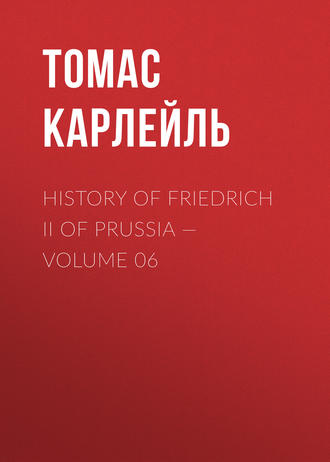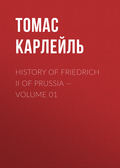
Томас Карлейль
History of Friedrich II of Prussia — Volume 06
HIS PRUSSIAN MAJESTY FALLS INTO ONE OF HIS HYPOCHONDRIACAL FITS
Before this event, his Majesty was in gloomy humor; and special vexations had superadded themselves. Early in the Spring, a difficult huff of quarrel, the consummation of a good many grudges long subsisting, had fallen out with his neighbor of Saxony, the Majesty of Poland, August, whom we have formerly heard of, a conspicuous Majesty in those days; called even "August the Great" by some persons in his own time; but now chiefly remembered by his splendor of upholstery, his enormous expenditure in drinking and otherwise, also by his three hundred and fifty-four Bastards (probably the maximum of any King's performance in that line), and called August DER STARKE, "August the Physically Strong." This exemplary Sovereign could not well be a man according to Friedrich Wilhelm's heart: accordingly they had their huffs and little collisions now and then: that of the Protestant Directorate and Heidelberg Protestants, for instance; indeed it was generally about Protestantism; and more lately there had been high words and correspondings about the "Protestants of Thorn" (a bad tragedy, of Jesuit intrusion and Polish ferocity, enacted there in 1724); [Account of it in Buchholz, i. 98-102.]—in which sad business Friedrich Wilhelm loyally interfered, though Britannic George of blessed memory and others were but lukewarm; and nothing could be done in it. Nothing except angry correspondence with King August; very provoking to the poor soul, who had no hand but a nominal one in the Thorn catastrophe, being driven into it by his unruly Diet alone.
In fact, August, with his glittering eyes and excellent physical constitution, was a very good-humored fellow; supremely pleasant in society; and by no means wishful to cheat you, or do you a mischief in business,—unless his necessities compelled him; which often were great. But Friedrich Wilhelm always kept a good eye on such points; and had himself suffered nothing from the gay eupeptic Son of Belial, either in their old Stralsund copartnery or otherwise. So that, except for these Protestant affairs,—and alas, one other little cause,—Friedrich Wilhelm had contentedly left the Physically Strong to his own course, doing the civilities of the road to him when they met; and nothing ill had fallen out between them. This other little cause—alas, it is the old story of recruiting; one's poor Hobby again giving offence! Special recruiting brabbles there had been; severe laws passed in Saxony about these kidnapping operations: and always in the Diets, when question rose of this matter, August had been particularly loud in his denouncings. Which was unkind, though not unexpected. But now, in the Spring of 1727, here has a worse case than any arisen.
Captain Natzmer, of I know not what Prussian Regiment, "Sachsen-Weimar Cuirassiers" [Militair-Lexikon, iii. 104.] or another, had dropt over into Saxony, to see what could be done in picking up a tall man or two. Tall men, one or two, Captain Natzmer did pick up, nay a tall deserter or two (Saxon soldier, inveigled to desert); but finding his operations get air, he hastily withdrew into Brandenburg territory again. Saxon Officials followed him into Brandenburg territory; snapt him back into Saxon; tried him by Saxon law there;—Saxon law, express in such case, condemns him to be hanged; and that is his doom accordingly.
"Captain Natzmer to swing on the gallows? Taken on Brandenburg territory too, and not the least notice given me?" Friedrich Wilhelm blazes into flaming whirlwind; sends an Official Gentleman, one Katsch, to his Excellenz Baron von Suhm (the Crown-Prince's cultivated friend), with this appalling message: "If Natzmer be hanged, for certain I will use reprisals; you yourself shall swing!" Whereupon Suhm, in panic, fled over the marches to his Master; who bullied him for his pusillanimous terrors; and applied to Friedrich Wilhelm, in fine frenzy of indignant astonishment, "What, in Heaven's name, such meditated outrage on the law of nations, and flat insult to the Majesty of Kings, can have meant?" Friedrich Wilhelm, the first fury being spent, sees that he is quite out of square; disavows the reprisals upon Suhm. "Message misdelivered by my Official Gentleman, that stupid Katsch; never did intend to hang Suhm; oh, no;" with much other correspondence; [In Mauvillon (ii. 189-195) more of it than any one will read.]—and is very angry at himself, and at the Natzmer affair, which has brought him into this bad pass. Into open impropriety; into danger of an utter rupture, had King August been of quarrelsome turn. But King August was not quarrelsome; and then Seckendorf and the Tobacco-Parliament,—on the Kaiser's score, who wants Pragmatic Sanction and much else out of these two Kings, and can at no rate have them quarrel in the present juncture,—were eager to quench the fire. King August let Natzmer go; Suhm returned to his post; [Pollnitz, ii. 254.] and things hustled themselves into some uneasy posture of silence again;—uneasy to the sensitive fancy of Friedrich Wilhelm above all. This is his worst collision with his Neighbor of Saxony; and springing from one's Hobby again!—
These sorrows, the death of George I., with anxieties as to George II. and the course he might take; all this, it was thought, preyed upon his Majesty's spirits;—Wilhelmina says it was "the frequent carousals with Seckendorf," and an affair chiefly of the royal digestive-apparatus. Like enough;—or both might combine. It is certain his Majesty fell into one of his hypochondrias at this time; talked of "abdicating" and other gloomy things, and was very black indeed. So that Seckendorf and Grumkow began to be alarmed. It is several months ago he had Franke the Halle Methodist giving ghostly counsel; his Majesty ceased to have the Newspapers read at dinner; and listened to lugubrious Franke's exhortations instead. Did English readers ever hear of Franke? Let them make a momentary acquaintance with this famous German Saint. August Hermann Franke, a Lubeck man, born 1663; Professor of Theology, of Hebrew, Lecturer on the Bible; a wandering, persecuted, pious man. Founder of the "Pietists," a kind of German Methodists, who are still a famed Sect in that country; and of the WAISENHAUS, at Halle, grand Orphan-house, built by charitable beggings of Franke, which also still subsists. A reverend gentleman, very mournful of visage, now sixty-four; and for the present, at Berlin, discoursing of things eternal, in what Wilhelmina thinks a very lugubrious manner. Well; but surely in a very serious manner! The shadows of death were already round this poor Franke; and in a few weeks more, he had himself departed. [Died 8th June, 1727.] But hear Wilhelmina, what account she gives of her own and the young Grenadier-Major's behavior on these mournful occasions. Seckendorf's dinners she considers to be the cause; all spiritual, sorrows only an adjunct not worth mentioning. It is certain enough.
"His Majesty began to become valetudinary; and the hypochondria which tormented him rendered his humor very melancholy. Monsieur Franke, the famous Pietist, founder of the Orphan-house at Halle University, contributed not a little to exaggerate that latter evil. This reverend gentleman entertained the King by raising scruples of conscience about the most innocent matters. He condemned all pleasures; damnable all of them, he said, even hunting and music. You were to speak of nothing but the Word of God only; all other conversation was forbidden. It was always he that carried on the improving talk at table; where he did the office of reader, as if it had been a refectory of monks. The King treated us to a sermon every afternoon; his valet-de-chambre gave out a psalm, which we all sang; you had to listen to this sermon with as much devout attention as if it had been an apostle's. My Brother and I had all the mind in the world to laugh; we tried hard to keep from laughing; but often we burst out. Thereupon reprimand, with all the anathemas of the Church hurled out on us; which we had to take with a contrite penitent air, a thing not easy to bring your face to at the moment. In a word, this dog of a Franke [he died within few months, poor soul, CE CHIEN DE FRANKE] led us the life of a set of Monks of La Trappe.
"Such excess of bigotry awakened still more gothic thoughts in the King. He resolved to abdicate the crown in favor of my Brother. He used to talk, He would reserve for himself 10,000 crowns a year; and retire with the Queen and his Daughters to Wusterhausen. There, added he, I will pray to God; and manage the farming economy, while my wife and girls take care of the household matters. You are clever, he said to me; I will give you the inspection of the linen, which you shall mend and keep in order, taking good charge of laundry matters. Frederika [now thirteen, married to ANSPACH two years hence], who is miserly, shall have charge of all the stores of the house. Charlotte [now eleven, Duchess of BRUNSWICK by and by] shall go to market and buy our provisions; and my Wife shall take charge of the little children, [says Friedrich Wilhelm], and of the kitchen." [Little children are:
1. Sophie Dorothee, now eight, who married Margraf of Schwedt, and was unhappy;
2. Ulrique, a grave little soul of seven, Queen of Sweden afterwards;
3. August Wilhelm, age now five, became Father of a new Friedrich Wilhelm, who was King by and by, and produced the Kings that still are;
4. Amelia, now four, born in the way we saw; and
5. HENRI, still in arms, just beginning to walk. There will be a Sixth and no more (son of this Sixth, a Berlin ROUE was killed, in 1806, at the Battle of Jena, or a day or two before); but the Sixth is not yet come to hand.]
Poor Friedrich Wilhelm; what an innocent IDYLLIUM;—which cannot be executed by a King. "He had even begun to work at an Instruction, or Farewell Advice, for my Brother; and to point towards various steps, which alarmed Grumkow and Seckendorf to a high degree." [Wilhelmina, Memoires de Bareith, i. 108.]
"Abdication," with a Crown-Prince ready to fall into the arms of England, and a sudden finis to our Black-Art, will by no means suit Seckendorf and Grumkow! Yet here is Winter coming; solitary Wusterhausen, with the misty winds piping round it, will make matters worse: something must be contrived; and what? The two, after study, persuade Fieldmarshal Flemming over at Warsaw (August the Strong's chief man, the Flemming of Voltaire's CHARLES XII.; Prussian by birth, though this long while in Saxon service), That if he the Fieldmarshal were to pay, accidentally, as it were, a little visit to his native Brandenburg just now, it might have fine effects on those foolish Berlin-Warsaw clouds that had risen. The Fieldmarshal, well affected in such a case, manages the little visit, readily persuading the Polish Majesty; and dissipates the clouds straightway,—being well received by Friedrich Wilhelm, and seconded by the Tobacco-Parliament with all its might. Out at Wusterhausen everything is comfortably settled. Nay Madam Flemming, young, brilliant, and direct from the seat of fashion; it was she that first "built up" Wilhelmina's hair on just principles, and put some life into her appearance. [Wilhelmina, i. 117.] And now the Fieldmarshal (Tobacco-Parliament suggesting it) hints farther, "If his Prussian Majesty, in the mere greatness of his mind, were to appear suddenly in Dresden when his royal Friend was next there,—what a sunburst after clouds were that; how welcome to the Polish Majesty!"—"Hm, Na, would it, then?"—The Polish Majesty puts that out of question; specially sends invitation for the Carnival-time just coming; and Friedrich Wilhelm will, accordingly, see Dresden and him on that occasion. [Ib. i. 108, 109; Pollnitz, ii. 254; Fassman, p. 374.] In those days, Carnival means "Fashionable Season," rural nobility rallying to head-quarters for a while, and social gayeties going on; and in Protestant Countries it means nothing more.
This, in substance, was the real origin of Friedrich Wilhelm's sudden visit to Dresden, which astonished the world, in January next. It makes a great figure in the old Books. It did kindle Dresden Carnival and the Physically Strong into supreme illumination, for the time being; and proved the seal of good agreement, and even of a kind of friendliness between this heteroclite pair of Sovereigns,—if anybody now cared for those points. It is with our Crown-Prince's share in it that we are alone concerned; and that may require a Chapter to itself.
Chapter III. — VISIT TO DRESDEN
One of the most important adventures, for our young Crown-Prince, was this visit of his, along with Papa, to Dresden in the Carnival of 1728. Visit contrived by Seckendorf and Company, as we have seen, to divert the King's melancholy, and without view to the Crown-Prince at all. The Crown-Prince, now sixteen, and not in the best favor with his Father, had not been intended to accompany; was to stay at Potsdam and diligently drill: nevertheless an estafette came for him from the gallant Polish Majesty;—Wilhelmina had spoken a word to good Suhm, who wrote to his King, and the hospitable message came. Friedrich made no loitering,—to Dresden is but a hundred miles, one good day;—he arrived there on the morrow after his Father; King "on the 14th January, 1728," dates Fassmann; "Crown-Prince on the 15th," which I find was Thursday. The Crown-Prince lodged with Fieldmarshal Flemming; Friedrich Wilhelm, having come in no state, refused King August's pressings, and took up his quarters with "the General Fieldmarshal Wackerbarth, Commandant in Dresden,"—pleasant old military gentleman, who had besieged Stralsund along with him in times gone. Except Grumkow, Derschau and one or two of less importance, with the due minimum of Valetry, he had brought no retinue; the Crown-Prince had Finkenstein and Kalkstein with him, Tutor and Sub-Tutor, officially there. And he lodges with old Count Flemming and his clever fashionable Madam,—the diligent but unsuccessful Flemming, a courtier of the highest civility, though iracund, and "with a passion for making Treaties," whom we know since Charles XII.'s time.
Amongst the round of splendors now set on foot, Friedrich Wilhelm had, by accident of Nature, the spectacle of a house on fire,—rather a symbolic one in those parts,—afforded him, almost to start with. Deep in the first Saturday night, or rather about two in the morning of Sunday, Wackerbarth's grand house, kindling by negligence somewhere in the garrets, blazed up, irrepressible; and, with its endless upholsteries, with a fine library even, went all into flame: so that his Majesty, scarcely saving his CHATOULLE (box of preciosities), had to hurry out in undress;—over to Flemming's where his Son was; where they both continued thenceforth. This was the one touch of rough, amid so much of dulcet that occurred: no evil, this touch, almost rather otherwise, except to poor Wackerbarth, whose fine House lay wrecked by it.
The visit lasted till February 12th, four weeks and a day. Never was such thrice-magnificent Carnival amusements: illuminations, cannon-salvoings and fire-works; operas, comedies, redoubts, sow-baitings, fox and badger-baiting, reviewing, running at the ring:—dinners of never-imagined quality, this, as a daily item, needs no express mention.
To the young Soldier-Apprentice all this was, of course, in pleasant contrast with the Potsdam Guard-house; and Friedrich Wilhelm himself is understood to have liked at least the dinners, and the airy courteous ways, light table-wit and extreme good humor of the host. A successful visit; burns off like successful fire-works, piece after piece: and what more is to be said? Of all this nothing;—nor, if we could help it, of another little circumstance, not mentioned by the Newspapers or Fassmann, which constitutes the meaning of this Visit for us now. It is a matter difficult to handle in speech. An English Editor, chary of such topics, will let two witnesses speak, credible both, though not eye-witnesses; and leave it to the reader so. Babbling Pollnitz is the first witness; he deposes, after alluding to the sumptuous dinings and drinkings there:—
"One day the two Kings, after dinner, went in domino to the redoubt [RIDOTTO, what we now call ROUT or evening party]. August had a mind to take an opportunity, and try whether the reports of Friedrich Wilhelm's indifference to the fair sex were correct or not. To this end, he had had a young damsel (JUNGE PERSON) of extraordinary beauty introduced into some side-room; where they now entered. She was lying on a bed, in a loose gauzy undress; and though masked, showed so many charms to the eye that the imagination could not but judge very favorably of the rest. The King of Poland approached, in that gallant way of his, which had gained him such favor with women. He begged her to unmask; she at first affected reluctance, and would not. He then told her who he was; and said, He hoped she would not refuse, when two Kings begged her to show them this complaisance. She thereupon took off her mask, and showed them one of the loveliest faces in the world. August seemed quite enchanted; and said, as if it had been the first time he ever saw her, He could not comprehend how so bewitching a beauty had hitherto remained unknown to him.
"Friedrich Wilhelm could not help looking at her. He said to the King of Poland, 'She is very beautiful, it must be owned;'—but at the same instant turned his eyes away from her; and left the room, and the ridotto altogether without delay; went home, and shut himself in his room. He then sent for Herr von Grumkow, and bitterly complained that the King of Poland wanted to tempt him. Herr von Grumkow, who was neither so chaste nor so conscientious as the King, was for making a jest of the matter; but the King took a very serious tone; and commanded him to tell the King of Poland in his name, 'That he begged him very much not to expose him again to accidents of that nature, unless he wished to have him quit Dresden at once.' Herr von Grumkow did his message. The King of Poland laughed heartily at it; went straight to Friedrich Wilhelm, and excused himself. The King of Prussia, however, kept his grim look; so that August ceased joking, and turned the dialogue on some other subject." [Pollnitz, ii. 256.]
This is Pollnitz's testimony, gathered from the whispers of the Tabagie, or rumors in the Court-circles, and may be taken as indisputable in the main. Wilhelmina, deriving from similar sources, and equally uncertain in details, paints more artistically; nor has she forgotten the sequel for her Brother, which at present is the essential circumstance:—
"One evening, when the rites of Bacchus had been well attended to, the King of Poland led the King [my Father], strolling about, by degrees, into a room very richly ornamented, all the furniture and arrangements of which were in a quite exquisite taste. The King, charmed with what he saw, paused to contemplate the beauties of it a little; when, all on a sudden, a curtain rose, and displayed to him one of the most extraordinary sights. It was a girl in the condition of our First Parents, carelessly lying on a bed. This creature was more beautiful than they paint Venus and the Graces; she presented to view a form of ivory whiter than snow, and more gracefully shaped than the Venus de' Medici at Florence. The cabinet which contained this treasure was lighted by so many wax-candles that their brilliancy dazzled you, and gave a new splendor to the beauties of the goddess.
"The Authors of this fine comedy did not doubt but the object would make an impression on the King's heart; but it was quite otherwise. No sooner had he cast his eyes on the beauty than he whirled round with indignation; and seeing my Brother behind him, he pushed him roughly out of the room, and immediately quitted it himself; very angry at the scene they had been giving him, He spoke of it, that same evening, to Grumkow, in very strong terms; and declared with emphasis that if the like frolics were tried on him again, he would at once quit Dresden.
"With my Brother it was otherwise. In spite of the King's care, he had got a full view of that Cabinet Venus; and the sight of her did not inspire in him so much horror as in his father." [Wilhelmina, i. 112.]—Very likely not!—And in fact, "he obtained her from the King of Poland, in a rather singular way (d'une facon assez singuliere)"—describable, in condensed terms, as follows:—
Wilhelmina says, her poor Brother had been already charmed over head and ears by a gay young baggage of a Countess Orzelska; a very high and airy Countess there; whose history is not to be touched, except upon compulsion, and as if with a pair of tongs,—thrice famous as she once was in this Saxon Court of Beelzebub. She was King August's natural daughter; a French milliner in Warsaw had produced her for him there. In due time, a male of the three hundred and fifty-four, one Rutowski, soldier by profession, whom we shall again hear of, took her for mistress; regardless of natural half-sisterhood, which perhaps he did not know of. The admiring Rutowski, being of a participative turn, introduced her, after a while, to his honored parent and hers; by whom next—Heavens, human language is unequal to the history of such things! And it is in this capacity she now shines supreme in the Saxon Court; ogling poor young Fritz, and driving him distracted;—which phenomenon the Beelzebub Parent-Lover noticed with pain and jealousy, it would appear.
"His Polish Majesty distinguished her extremely," says Pollnitz, [Memoires, ii.261.] "and was continually visiting her; so that the universal inference was"—to the above unspeakable effect. "She was of fine figure; had something grand in her air and carriage, and the prettiest humor in the world. She often appeared in men's clothes, which became her very well. People said she was extremely open-handed;" as indeed the Beelzebub Parent-Lover was of the like quality (when he had cash about him), and to her, at this time, he was profuse beyond limit. Truly a tempting aspect of the Devil, this expensive Orzelska: something beautiful in her, if there are no Laws in this Universe; not so beautiful, if there are! Enough to turn the head of a poor Crown-Prince, if she like, for some time. He is just sixteen gone; one of the prettiest lads and sprightliest; his homage, clearly enough, is not disagreeable to the baggage. Wherefore jealous August, the Beelzebub-Parent, takes his measures; signifies to Fritz, in direct terms, or by discreet diplomatic hints and innuendoes, That he can have the Cabinet Venus (Formera her name, of Opera-singer kind);—hoping thereby that the Orzelska will be left alone in time coming. A "facon assez singuliere" for a Sovereign Majesty and Beelzebub Parent-Lover, thinks Wilhelmina.
Thus has our poor Fritz fallen into the wake of Beelzebub; and is not in a good way. Under such and no better guidance, in this illicit premature manner, he gets his introduction to the paradise of the world. The Formera, beautiful as painted Chaos; yes, her;—and why not, after a while, the Orzelska too, all the same? A wonderful Armida-Garden, sure enough. And cannot one adore the painted divine beauties there (lovely as certain apples of the Dead Sea), for some time?—The miseries all this brought into his existence,—into his relations with a Father very rigorous in principle, and with a Universe still more so,—for years to come, were neither few nor small. And that is the main outcome of the Dresden visitings for him and us.—
Great pledges pass between the two Kings; Prussian Crown-Prince decorated with the Order of the Saxon Eagle, or what supreme distinction they had: Rutowski taken over to Berlin to learn war and drill, where he did not remain long: in fact a certain liking seems to have risen between the two heteroclite individualities, which is perhaps worth remembering as a point in natural history, if not otherwise. One other small result of the visit is of pictorial nature. In the famed Dresden Gallery there is still a Picture, high up, visible if you have glasses, where the Saxon Court-Painter, on Friedrich Wilhelm's bidding it is said, soon after these auspicious occurrences, represents the two Majesties as large as life, in their respective costumes and features (short Potsdam Grenadier-Colonel and tall Saxon Darius or Sardanapalus), in the act of shaking hands; symbolically burying past grudges, and swearing eternal friendship, so to speak. [Forster, i. 226.] To this Editor the Picture did not seem good for much; but Friedrich Wilhelm's Portrait in it, none of the best, may be of use to travelling friends of his who have no other.
The visit ended on the 12th of February, as the Newspapers testify. Long before daybreak, at three in the morning, Friedrich Wilhelm, "who had smoked after dinner till nine the night before," and taken leave of everybody, was on the road; but was astonished to find King August and the Electoral Prince or Heir-Apparent (who had privately sat up for the purpose) insist on conducting him to his carriage. [Boyer, xxxv. 198.] "Great tokens of affection," known to the Newspapers, there were; and one token not yet known, a promise on King August's part that he would return this ever-memorable compliment in person at Potsdam and Berlin in a few months. Remember, then!—
As for the poor Crown-Prince, whom already his Father did not like, he now fell into circumstances more abstruse than ever in that and other respects. Bad health, a dangerous lingering fit of that, soon after his return home, was one of the first consequences. Frequent fits of bad health, for some years coming; with ominous rumors, consultations of physicians, and reports to the paternal Majesty, which produced small comfort in that quarter. The sad truth, dimly indicated, is sufficiently visible: his life for the next four or five years was "extremely dissolute." Poor young man, he has got into a disastrous course; consorts chiefly with debauched young fellows, as Lieutenants Katte, Keith, and others of their stamp, who lead him on ways not pleasant to his Father, nor conformable to the Laws of this Universe. Health, either of body or of mind, is not to be looked for in his present way of life. The bright young soul, with its fine strengths and gifts; wallowing like a young rhinoceros in the mud-bath:—some say, it is wholesome for a human soul; not we!
All this is too certain; rising to its height in the years we are now got to, and not ending for four or five years to come: and the reader can conceive all this, and whether its effects were good or not. Friedrich Wilhelm's old-standing disfavor is converted into open aversion and protest, many times into fits of sorrow, rage and despair, on his luckless Son's behalf;—and it appears doubtful whether this bright young human soul, comparable for the present to a rhinoceros wallowing in the mud-bath, with nothing but its snout visible, and a dirty gurgle all the sound it makes, will ever get out again or not.
The rhinoceros soul got out; but not uninjured; alas, no; bitterly polluted, tragically dimmed of its finest radiances for the remainder of life. The distinguished Sauerteig, in his SPRINGWURZELN, has these words: "To burn away, in mad waste, the divine aromas and plainly celestial elements from our existence; to change our holy-of-holies into a place of riot; to make the soul itself hard, impious, barren! Surely a day is coming, when it will be known again what virtue is in purity and continence of life; how divine is the blush of young human cheeks; how high, beneficent, sternly inexorable if forgotten, is the duty laid, not on women only, but on every creature, in regard to these particulars? Well; if such a day never come again, then I perceive much else will never come. Magnanimity and depth of insight will never come; heroic purity of heart and of eye; noble pious valor, to amend us and the age of bronze and lacquer, how can they ever come? The scandalous bronze-lacquer age, of hungry animalisms, spiritual impotencies and mendacities, will have to run its course, till the Pit swallow it."—
In the case of Friedrich, it is certain such a day never fully came. The "age of bronze and lacquer," so as it then stood,—relieved truly by a backbone of real Spartan IRON (of right battle STEEL when needed): this was all the world he ever got to dream of. His ideal, compared to that of some, was but low; his existence a hard and barren, though a genuine one, and only worth much memory in the absence of better. Enough of all that.







